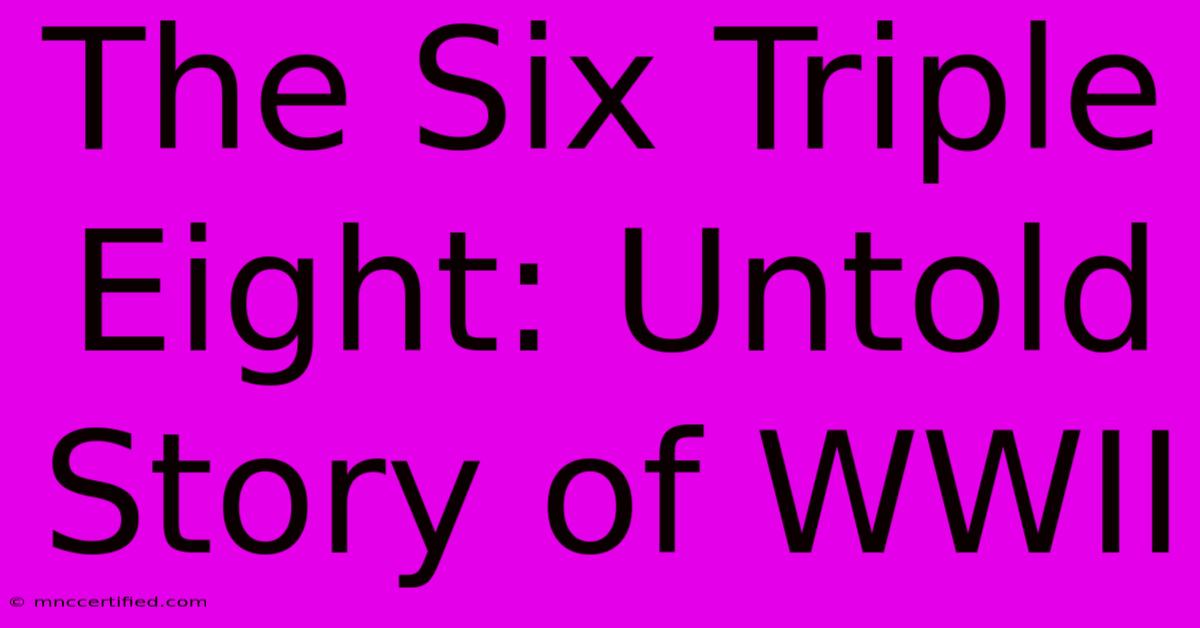The Six Triple Eight: Untold Story Of WWII

Table of Contents
The Six Triple Eight: Untold Story of WWII's Extraordinary Women
The Second World War was a time of unprecedented global conflict, demanding immense contributions from all corners of society. While the bravery of soldiers on the front lines is widely recognized, the stories of countless others who played pivotal roles often remain untold. One such remarkable story is that of the 6888th Central Postal Directory Battalion, a unit comprised entirely of Black women who served in the Women's Army Corps (WAC) during WWII. Their incredible contributions to the war effort are finally receiving the recognition they deserve, shedding light on a vital, yet often overlooked, aspect of this historical period.
Overcoming Prejudice and Prejudice: The Formation of the 6888th
The formation of the 6888th was a groundbreaking event in itself. At a time when segregation was deeply entrenched in American society, these women faced not only the challenges of war but also the systemic racism that permeated the military. Their recruitment was a direct response to the overwhelming backlog of mail piling up in European depots. The sheer volume of undelivered letters and packages threatened the morale of troops fighting overseas, highlighting a critical logistical failure. The army needed a solution, and the brave women of the 6888th stepped up to answer the call.
Breaking Barriers: More Than Just Mail Handlers
The 6888th wasn't simply a mail-sorting unit. These women handled an astonishing amount of mail, processing millions of pieces of correspondence – a monumental task under incredibly challenging circumstances. They worked tirelessly in often dangerous conditions, facing air raids and the constant threat of enemy attacks. Their work was crucial in maintaining communication between soldiers and their families back home, boosting morale and providing a much-needed link to the outside world. They were instrumental in ensuring that soldiers received vital updates from home, reinforcing their connection to loved ones amidst the horrors of war.
The Impact of Their Service: Beyond the Battlefield
The impact of the 6888th extended far beyond the efficient processing of mail. Their unwavering dedication and resilience in the face of adversity served as a powerful symbol of strength and perseverance. Their contributions challenged deeply ingrained societal prejudices and highlighted the crucial role of Black women in the war effort. The story of the 6888th is a testament to their unwavering dedication and a powerful reminder that the fight for equality and recognition extends beyond the battlefield.
Unsung Heroines: Reclaiming Their Place in History
For years, the remarkable achievements of the 6888th remained largely unknown. Their story was overshadowed by the dominant narratives of the war, a testament to the pervasive biases and inequalities that marginalized their contributions. However, recent efforts to acknowledge their service are finally bringing their story to light, ensuring that these unsung heroines receive the recognition and respect they rightfully deserve. Their legacy serves as an inspiration, not only for future generations of women in the military but for everyone striving for equality and justice.
Preserving Their Legacy: Remembering the 6888th
The story of the 6888th is not just a historical account; it's a powerful reminder of the crucial role women played in WWII and the importance of recognizing the contributions of all individuals who served. Learning about their sacrifices and achievements helps us understand the complex dynamics of the war and the enduring fight for equality. By actively seeking out and sharing their story, we ensure that the legacy of these courageous women lives on, inspiring future generations to strive for a more just and equitable world.
Keywords: 6888th Central Postal Directory Battalion, WWII, Women's Army Corps (WAC), Black women in WWII, unsung heroes, military history, World War II, African American history, women's history, postal service, mail handling, segregation, racism, overcoming adversity, morale, contributions of women in war.
On-Page SEO: The article uses keywords naturally throughout, optimizing header tags (H2, H3) for better SEO.
Off-Page SEO: Promote this article through social media sharing, guest blogging on relevant history websites, and engaging in relevant online forums and communities focused on WWII history and women's history. Consider building backlinks to this article from reputable websites.

Thank you for visiting our website wich cover about The Six Triple Eight: Untold Story Of WWII. We hope the information provided has been useful to you. Feel free to contact us if you have any questions or need further assistance. See you next time and dont miss to bookmark.
Featured Posts
-
Gasparilla Bowl 3 30 Pm Espn 2
Dec 21, 2024
-
Juric Linked To Southampton Manager Role
Dec 21, 2024
-
Car Crash At German Christmas Market Casualties
Dec 21, 2024
-
Crypto Investigation Hawk Tuahs Response
Dec 21, 2024
-
Tyler Perrys Six Triple Eight A Review
Dec 21, 2024